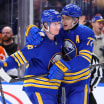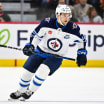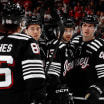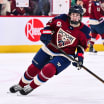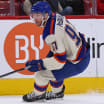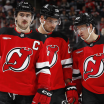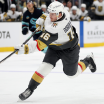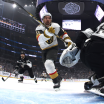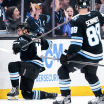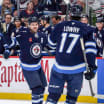On May 7, 2014, the Pittsburgh Penguins defeated the New York Rangers 4-2 at Madison Square Garden in Game 4 of their Eastern Conference Second Round series and looked primed to put their division rivals away.
The Penguins, who lost Game 1 of that series, won three straight, outscoring New York 9-2 in those games, and seemed on their way to the Eastern Conference Final.
Rangers vs. Penguins First Round series preview
Injury questions for Pittsburgh in net, New York on defense
By
Wes Crosby and Dan Rosen / NHL.com
But the Rangers stormed back to win the next three games of the series, including a 2-1 victory in Game 7 in Pittsburgh. The Penguins fired coach Dan Blysma after the season. In the 2015 playoffs, the Rangers eliminated the Penguins in five games, giving them a 7-1 record against Pittsburgh in the postseason since Game 4 in 2014.
The Penguins appeared to be suffering from the hangover of another playoff ouster at the start of this season, going 15-10-3, resulting in the firing of coach Mike Johnston. But new coach Mike Sullivan, a former Rangers assistant, turned them around, and the Penguins enter the playoffs as one of the hottest teams in the League.
Pittsburgh has the best player on its side in Sidney Crosby, who scored 36 goals and had 85 points after a slow start. The Penguins also have workhorse defenseman Kris Letang and speedy forward Carl Hagelin, who finished off Pittsburgh in the 2015 series with an overtime goal for New York in Game 5.
But the Rangers have goalie Henrik Lundqvist, who had another stellar season and has won a total of 24 playoff games in the past two seasons. The Rangers are banged up, with captain Ryan McDonagh possibly out for at least the start of the series with a hand injury. Fellow defenseman Dan Girardi is also questionable, as is center Eric Staal, who was acquired from the Carolina Hurricanes in a trade on Feb. 28.
There will be no shortage of drama in this series when the teams meet for the third straight year in the postseason.

© Jared Silber/Getty Images
FORWARDS
Penguins:Pittsburgh looks like itself after seemingly losing its identity for more than a season. After struggling to score throughout Johnston's tenure, the Penguins' once-explosive offense has returned behind a rejuvenated Crosby.
After the worst start to a season in his 11-season NHL career (two goals and seven assists in his first 18 games), Crosby rebounded. Evgeni Malkin, who was Pittsburgh's lone consistent offensive threat through December, is recovering from an upper-body injury that could keep him out through the first round.
Forward Nick Bonino has replaced Malkin between Hagelin and Phil Kessel. That dynamic has actually improved in Malkin's absence with Bonino catering to his linemates' speed by playing a more of a north-south style than the east-west game Malkin prefers.
Outside of Malkin, Pittsburgh's forward depth was hurt by injuries to bottom-six forwards Kevin Porter, Scott Wilson and Bryan Rust. But the Penguins have gotten used to patching their bottom two lines with forwards from Wilkes-Barre/Scranton of the American Hockey League who have surprisingly added more production.
Forwards Conor Sheary and Tom Kuhnhackl, who each made his NHL debut this season, have been able to score a goal on occasion, and although rookie center Oskar Sundqvist hasn't found a spark, he has anchored a fourth line, including forward Beau Bennett, that has potential to score a timely goal when needed, and that's more than could have been said regarding Penguins fourth lines of seasons past.
"They do a lot of those thankless jobs that don't show up on the scoresheet," Sullivan said. "But they certainly help us win games. We've got a number of those guys in our lineup right now, and sometimes it's hard to quantify their contribution in a statistic, but I think the players in the room recognize how hard those guys are playing for us, and that's why I think this group has come together like it has."
The true glue of the bottom six has been veteran forward Matt Cullen, who has surprised by going on a late-season surge at the age of 39 while centering the third line. Cullen had 16 goals and 16 assists.
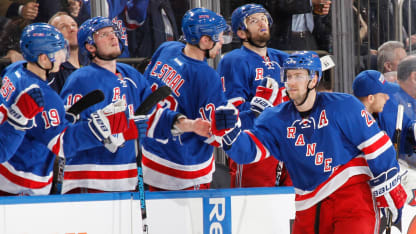
© Jared Silber/Getty Images
Rangers: The first place to look is their depth down the middle, starting with Derick Brassard and Derek Stepan. Brassard had arguably the best offensive season of his NHL career with 27 goals and 31 assists. Stepan set a personal NHL best with 22 goals while taking more shots per game than he did in any of his previous five seasons.
New York could go into Game 1 with two centers on its third line. Kevin Hayes technically is the center because that's where he's most comfortable, but Eric Staal has been a center most of his NHL career and is better in the faceoff circle. Staal's status for the start of the playoffs is unknown after he left the season finale Saturday after being hit in the head by teammate Jesper Fast.
Dominic Moore is the prototypical forechecking, aggressive, defensively aware fourth-line center the Rangers need him to be.
The Rangers attack from the wings with speed, size and skill. Rick Nash, Chris Kreider, J.T. Miller and Staal combine those elements. In particular, when Nash, Kreider and Miller attack the net, they can be impossible to stop. The problem is they don't always do that.
Mats Zuccarello, whose 61 points led New York, is the antithesis of the Rangers because he's 5-foot-7. But what he lacks in size he makes up for with his skill and fearlessness.
Fast won't wow anybody with his skill, but he might be the Rangers' most important forward. He can play on any line, and it seems no matter where coach Alain Vigneault puts him, that line is better for it. He's been with Hayes and Staal most recently.
Viktor Stalberg and Tanner Glass have joined Moore to make up a fourth line that at times has been New York's most consistent in terms of the pace and aggressiveness it has to bring. If needed, Oscar Lindberg gives Vigneault a versatile option because he can play center or wing.
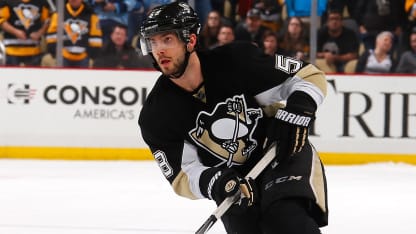
© Gregory Shamus/Getty Images
DEFENSEMEN
Penguins: Letang has been more impressive than Crosby in recent months, and that's saying something. Letang has been the Penguins' workhorse along the blue line, averaging nearly 27 minutes per game, occasionally surpassing 30 minutes, including against the Buffalo Sabres on March 29, when he played a career-high 35:14.
What's made Letang's effort even more eye-opening is he has done it without his partner, Olli Maatta, who is week-to-week with a lower-body injury. Trevor Daley has stepped in next to Letang and has filled the role well. The remaining two defensive pairs have played solid defense while providing some offensive punch.
After being scratched for a month from Jan. 21-Feb. 21, Ian Cole has been slotted alongside Justin Schultz on Pittsburgh's third pair. Cole has responded with possibly his best effort since being acquired from the St. Louis Blues last season.
Maatta's absence could hurt if it lingers well into the postseason. Maatta and Letang bring a combination of offensive efficiency and defensive acumen that is nearly impossible for the Penguins to replicate.
Letang most likely will continue to produce at a high rate, and Daley can, and probably will, keep up, but it's hard to imagine a loss the size of Maatta not being felt in the playoffs.
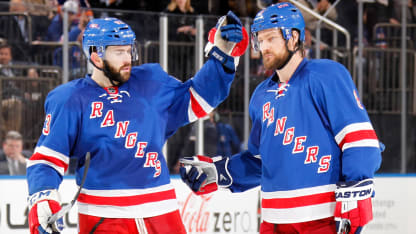
© Jared Silber/Getty Images
Rangers: McDonagh, New York's captain and best defenseman, missed the final three games of the regular season because of a hand injury and is out indefinitely. Dan Girardi missed the last two games of the regular season and is day-to-day because of an upper-body injury.
Girardi's injury seems less restrictive than McDonagh's, but losing McDonagh for any amount of time in the playoffs is a far more significant blow for the Rangers than if they were to lose Girardi. McDonagh led the Rangers in average ice time per game at 22:21 and he routinely is matched against the opposition's best line.
But the Rangers have depth, balance and experience behind McDonagh and Girardi with Kevin Klein, Marc Staal, Keith Yandle and Dan Boyle.
Klein is Vigneault's version of a Swiss Army knife, in that he can play on any pair, on the penalty kill or the power play, as few or as many minutes as you want him to play, and he'll be effective. Marc Staal was better with his reads with and without the puck in the final quarter of the season than he was in the first three-quarters. Yandle is the Rangers' most dynamic with his vision, puck-carrying skills and passing ability. He quarterbacks their first power-play unit.
New York tends to control possession when Boyle is on the ice because he typically doesn't face the toughest matchups. He still provides them with a threat on the power play.
Rookies Dylan McIlrath and Brady Skjei may be forced into action if McDonagh and Girardi can't play. Skjei is more dynamic. McIlrath is physical but has to watch his positioning.
GOALTENDERS
Penguins: This is the major question mark for Pittsburgh. Marc-Andre Fleury, the main reason the Penguins survived a dreadful first two months, sustained his second concussion this season during Pittsburgh's 5-2 win against the Nashville Predators on March 31.
Backup Matthew Murray went 4-0-0 after Fleury was injured, but Murray's status is in question after he left a 3-1 loss against the Philadelphia Flyers on Saturday following a collision with Brayden Schenn. On Sunday, Pittsburgh called up Tristan Jarry from Wilkes Barre/Scranton.
Even if Murray is ready, he has yet to experience the pressure of the playoffs. It's difficult to speculate how Murray, 21, would respond.
Jeff Zatkoff, who filled in for Murray against the Flyers on Saturday, has made 35 career NHL starts and is 16-14-3 over three seasons.
Rangers: New York has felt that it's had the better goalie going into every playoff series since Lundqvist established himself as a No. 1 in the League. Nothing changes this season. Lundqvist remains an elite goalie who can steal a game and dominate a series.
Lundqvist, always the Rangers' most valuable player, has been a dominant playoff goalie with 54 wins, a .923 save percentage and a 2.22 goals-against average in 111 postseason games, all starts. In two playoff runs under Vigneault, Lundqvist has 24 wins, a .927 save percentage and a 2.12 GAA.
Lundqvist also might be the best Game 7 goalie in NHL history.
He won an NHL-record six consecutive Game 7s before losing 2-0 to the Tampa Bay Lightning in Game 7 of the Eastern Conference Final last season. He has allowed nine goals on 333 shots for a .961 save percentage in eight Game 7s.
Antti Raanta had a solid season as the backup, but the Rangers can't fathom what life would be like in the playoffs without Lundqvist because they haven't had to deal with it since he arrived in 2005. If he goes down, the Rangers might quickly follow.
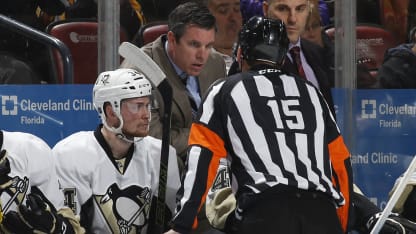
© Joel Auerbach/Getty Images
COACHES
Penguins: Sullivan has done a masterful job turning Pittsburgh around since taking over for Johnston on Dec. 12, when the Penguins were 15-10-3 and struggling to consistently score more than two goals.
The turnaround didn't happen immediately. Sullivan's Penguins looked similar to Johnston's during a four-game losing streak at the start of the new coach's tenure. But the offense eventually started to spark.
Crosby started clicking, Malkin didn't slow, Letang rebounded, and eventually Kessel began playing like the forward Pittsburgh expected to have when they acquired him from the Toronto Maple Leafs in July.
The Penguins have fallen behind by multiple goals and won several times recently, including a 5-3 victory against the Ottawa Senators on April 5 after trailing 3-0 early in the second period. Pittsburgh seems to have a newfound confidence it lacked near the end of last season and early this season, and much of the credit can go to Sullivan.
"I think every year, you want to be peaking right about now," defenseman Ben Lovejoy said. "You want to be playing your best hockey come the spring. I think last year was very difficult at this time. This year just has been completely different. We feel when we're playing our best hockey, we can beat pretty much anybody on any night."
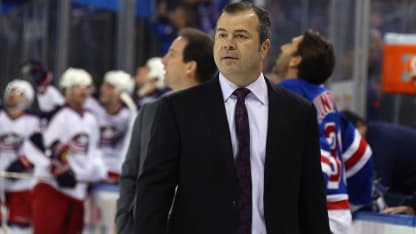
© Bruce Bennett/Getty Images
Rangers: New York has gone deeper in the playoffs in each of Vigneault's two seasons then they had in any of their previous 10 postseason appearances. They got to Game 5 of the Stanley Cup Final in 2014 and Game 7 of the conference final last season. They are 24-20 under Vigneault in the postseason.
Vigneault is 61-61 in the playoffs during his NHL career and is tied for fifth in playoff wins among active coaches with Claude Julien of the Boston Bruins; Vigneault and Julien are tied with Jacques Lemaire for 14th all-time in Stanley Cup Playoff wins. Vigneault's 122 NHL postseason games coached are 12th all-time.
But unlike the other five active coaches with as many or more playoff wins, Vigneault does not have a Stanley Cup championship. He has been to the Stanley Cup Final twice, including to Game 7 with the Vancouver Canucks against the Bruins in 2011.
Pat Quinn is the only NHL coach with more playoff wins (94) and games coached (183) than Vigneault without a Stanley Cup championship.
SPECIAL TEAMS
Penguins: As explosive as Pittsburgh is 5-on-5, it can be that lackluster 5-on-4.
The Penguins power play has regained some of its form recently, going 3-for-5 in back-to back wins against the New York Islanders and Flyers on April 2 and 3, but it has been Pittsburgh's least effective component for most of the past month. Without Malkin, the Penguins sometimes seem lost on the man-advantage, casually passing the puck and routinely killing a chunk of their own power play before eventually taking a shot that is blocked and sent out of the zone.
Even when Malkin is in the lineup, the Penguins occasionally have a problem with over-passing, but the play seems to settle and the top unit looks more organized. With Malkin out, Pittsburgh has tweaked its two units before nearly every game in an attempt to restore any potency.
The penalty kill has been a different story. It was fifth in the NHL (84.4 percent) while playing an aggressive style that has led to a string of shorthanded goals in recent weeks.
Rangers:New York's power play has run hot and cold, but overall it's been above average and helpful, particularly at home, for the majority of the season.
It was 8-for-45 (17.8 percent) through the first 19 games. That preceded a relatively hot 17-game stretch in which it went 14-for-57 (24.6 percent) from Nov. 21-Dec. 22. Then it dove into a 2-for-50 stretch over 18 games through Feb. 10.
But the power play has been a consistent source for offense since then, clicking at roughly 25 percent in the last two months of the regular season, a good sign going into the playoffs.
It's also a good sign that the penalty kill got better in the last quarter of the season after Eric Staal was acquired. Overall, New York's penalty kill was 26th in the League (78.2 percent), but it has looked better of late.
SERIES CHANGERS
Penguins: Carl Hagelin, forward -- The word that comes to mind when analyzing Hagelin's style of play is "speed."
He has what Pittsburgh desperately needed when he was acquired from the Anaheim Ducks on Jan. 16. That trade has paid off in a big way by rounding out the Penguins' top six, and that was noticeable when he scored in six of seven games from March 26-April 5, with five goals and three assists.
With Hagelin's addition to the second line alongside Bonino and Kessel (if Malkin isn't ready to return), the Penguins have at least two lines that realistically can be expected to produce throughout the postseason. That wasn't the case at this time last year, when Crosby and Patric Hornqvist seemed to be the only Penguins capable of scoring in losing to Hagelin and the Rangers in five games in the first round.
If Pittsburgh struggles in a similar way this time around, it would be somewhat of a surprise, because Hagelin appears poised to continue his surge into the playoffs.
Rangers: Chris Kreider, forward -- New York's chances of getting out of the first round partially hinge on which version of Kreider shows up. He has the ability to change a game, which could in theory change a series, with his speed and ability to create havoc in front of the goalie.
The Rangers will be in trouble if the Kreider who shows up in the first round is the same one from the first half of the season, the player who looked a step behind, out of position and generally inconsequential because he wasn't driving to the net or creating any commotion on the forecheck.
They'll have a great chance of moving on if Kreider brings the play he demonstrated in most of the games after the All-Star break. That was Kreider doing what he does best -- setting the pace, going to the net, taking risks, making plays and doing it all without thinking too much.
Kreider got hot at the end of the season, a reason why he scored his 20th goal in his 76th game. He should have pushed for 30 this season, but he can make up for it in the playoffs.
WILL WIN IF …
Penguins: They must lessen the pressure on their goaltender, no matter who is in net.
Pittsburgh must continue to score. That's who the Penguins are and that's when they're at their best. They can't fall into the same trap they have in recent postseasons, attempting to play a playoff style that's simply out of character.
For the Penguins to be successful, they will need to control the narrative of the series and force the opponent to cater to an up-tempo style that plays into their hands. Keep Murray clean, and the rookie likely will have a solid series. The same goes if Fleury returns from his concussion.
Ease Murray into it instead of leaning heavily on him. And if it is Fleury, allow him to find his bearings without expecting him to steal a game or two coming off an injury.
Rangers:They must attack early and get their big forwards to play aggressively in front of the net.
New York needs Nash to be effective, meaning he has to use his strength to get inside position. Eric Staal, Miller, Hayes and Kreider have to follow suit. Brassard, Stepan, Zuccarello and Fast have been fairly predictable in their game this season, but the four big forwards have been inconsistent. They have to establish themselves early in the series.
The Rangers also have to rely on Marc Staal, Klein, Yandle and Boyle to pick up some of the slack because it's unclear if McDonagh and Girardi will play early in the series, and how healthy they will be if they do.
As usual, Lundqvist has to be the MVP. Everything revolves around him being good.
